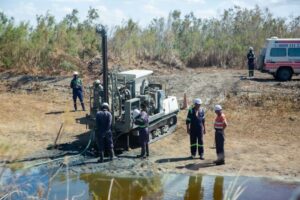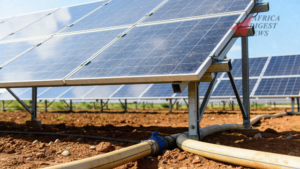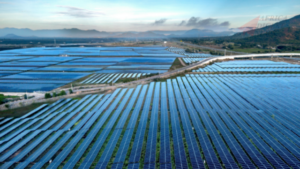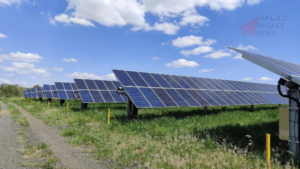
QatarEnergy has agreed to acquire a 27% participating interest in the North Cleopatra offshore exploration block in Egypt from Shell, in a deal announced on October 5–6, 2025. Shell will remain the operator with a 36% stake, while Chevron holds another 27%, and Tharwa Petroleum Company, an Egyptian firm, retains 10%. The transaction is subject to approval by the Egyptian government.
Quick facts and ownership split
The North Cleopatra block lies in the frontier Herodotus Basin of the eastern Mediterranean, a deepwater zone that has attracted renewed interest from global energy firms. The block covers over 3,400 square kilometres with water depths reaching 2,600 metres.
QatarEnergy’s announcement emphasized that the acquisition expands its upstream footprint in the Mediterranean. The company did not disclose financial terms, but the deal reflects a growing trend of regional partnerships in high-cost deepwater exploration.
Saad Sherida Al-Kaabi, Qatar’s Minister of State for Energy Affairs and CEO of QatarEnergy, said the deal aligns with QatarEnergy’s long-term vision to strengthen energy partnerships in Africa and the Mediterranean. Shell, meanwhile, called the partnership “strategically complementary,” noting that it helps de-risk the exploration phase while preserving operatorship.
Where North Cleopatra sits inside the Herodotus Basin
The Herodotus Basin is a frontier exploration area located offshore Egypt and Cyprus. Despite limited drilling so far, geologists believe the basin could contain significant gas-bearing formations similar to nearby discoveries such as Egypt’s Zohr field and Israel’s Leviathan field.
The block’s location positions it strategically close to Egypt’s liquefied natural gas (LNG) export terminals at Idku and Damietta. Any successful discovery could therefore feed directly into Egypt’s domestic and export gas networks, a key incentive for both Shell and QatarEnergy.
Why QatarEnergy is expanding in Egypt
QatarEnergy has been systematically expanding its presence across Africa and the Mediterranean. In the past two years, the company has acquired multiple exploration interests, including:
- A 40% stake in ExxonMobil-operated Cairo and Masry blocks in 2024.
- A 23% working interest in the North El-Dabaa (H4) block from Chevron in late 2024
The North Cleopatra acquisition continues this pattern building on QatarEnergy’s global exploration portfolio and deepening its strategic partnership with major international oil companies (IOCs).
For Egypt, the deal supports its push to attract foreign investment to offset declining natural gas output. The country’s Ministry of Petroleum and Mineral Resources has made it clear that fresh partnerships and offshore exploration are key to meeting future domestic energy demand and restoring Egypt’s status as a regional gas hub.
Market, technical, and geopolitical implications
1. Shared exploration risk
By bringing QatarEnergy into the North Cleopatra project, Shell distributes the financial and geological risks of deepwater exploration. Drilling in ultra-deep zones like the Herodotus Basin can cost hundreds of millions of dollars per well, making partnerships critical.
2. Confidence in Egypt’s offshore potential
The deal demonstrates continued confidence in Egypt’s deepwater frontier. After several years of slower exploration activity, Cairo’s offshore acreage is once again attracting attention from major players partly due to regional success stories like Zohr and Leviathan.
3. Strengthened regional ties
This transaction reinforces energy cooperation between Qatar and Egypt, following improved diplomatic relations and growing trade. For Egypt, Qatar’s financial strength and LNG expertise could translate into technical support and long-term investment stability.
4. Strategic LNG advantage
If exploration proves successful, gas from North Cleopatra could strengthen Egypt’s position as a Mediterranean LNG export hub. With existing LNG plants underutilized, Egypt is eager for new gas supplies to boost exports and foreign currency inflows.
5. Shell’s evolving upstream strategy
Shell’s decision to retain operatorship but reduce its stake aligns with its broader global strategy: maintaining control of key projects while spreading financial exposure. This approach allows Shell to focus on exploration leadership without shouldering the entire cost burden.
What to watch next
Government approval:
The deal must receive clearance from Egypt’s government. Approvals typically include terms on local content, data-sharing, and exploration commitments.
Seismic and drilling plans:
The partners are expected to carry out new 3D seismic surveys and refine prospects before committing to a first exploration well, possibly within the next 18–24 months.
Potential discoveries:
The geological characteristics of the Herodotus Basin suggest that any major gas discovery could have a transformative effect on Egypt’s offshore sector and the region’s gas trade balance.
Regional cooperation:
Should exploration succeed, it could lead to shared infrastructure development such as pipeline or processing facilities linking with existing Egyptian assets.
Also read: Why Egypt Is Turning to TotalEnergies for LNG as Domestic Gas Runs Low
FAQ:
1. What is the North Cleopatra offshore block?
The North Cleopatra block is an offshore exploration area located in the Herodotus Basin of the eastern Mediterranean, off the coast of Egypt. It covers approximately 3,400 square kilometres in water depths of up to 2,600 metres. The block is considered a frontier deepwater zone with promising geological potential for natural gas discoveries.
2. Who are the partners in the North Cleopatra project?
Following the transaction, the partnership structure is as follows:
- Shell – 36% (Operator)
- QatarEnergy – 27%
- Chevron – 27%
- Tharwa Petroleum Company (Egypt) – 10%
Shell will remain the operator, managing exploration and technical activities, while the other partners share investment, expertise, and risk.
3. Why did QatarEnergy buy a stake in the North Cleopatra block?
QatarEnergy’s investment aligns with its global strategy to expand in key energy markets, especially in regions with untapped gas potential. Egypt’s offshore basins are strategically located near existing LNG export terminals and growing gas demand in Europe. This deal strengthens QatarEnergy’s influence in the Mediterranean and supports its ambition to become a leading global player in natural gas exploration.
4. What makes the Herodotus Basin significant?
The Herodotus Basin is one of the least explored regions of the eastern Mediterranean, believed to contain large gas-bearing formations. It lies close to other world-class discoveries such as Egypt’s Zohr field and Israel’s Leviathan and Tamar fields. Successful exploration could help Egypt boost its domestic gas production and reinforce its role as a regional energy hub.
5. How does this deal benefit Egypt?
For Egypt, QatarEnergy’s entry brings foreign capital, advanced technology, and exploration experience. It signals investor confidence in the country’s offshore sector and supports government efforts to increase exploration, improve energy security, and enhance LNG export capacity. The deal also strengthens Egypt-Qatar relations, which have warmed significantly in recent years.
6. When will exploration drilling begin?
The partners are expected to conduct new 3D seismic surveys and finalize prospect mapping before committing to the first exploration well. Depending on government approval and data results, drilling could begin within the next 18–24 months. Timelines may vary based on exploration results and market conditions.
7. What happens if significant gas is discovered?
If exploration leads to a commercial gas discovery, Shell and its partners would move into an appraisal and development phase, which could involve drilling additional wells and building subsea or pipeline infrastructure. The gas could be used domestically or exported via Egypt’s LNG facilities in Idku or Damietta.
8. How does this transaction fit QatarEnergy’s broader strategy?
QatarEnergy has been aggressively expanding internationally, investing in upstream projects across Africa, the Mediterranean, and Latin America. In Egypt alone, the company holds stakes in several other exploration blocks, including North El-Dabaa, Masry, and Cairo.
These deals align with QatarEnergy’s long-term vision to strengthen global partnerships and secure diversified gas resources.
9. What are the main challenges for the project?
The primary challenges include deepwater drilling costs, which can reach hundreds of millions of dollars, geological uncertainty in unexplored basins, and market fluctuations affecting investment returns. However, the presence of strong partners like Shell, Chevron, and QatarEnergy reduces both financial and operational risks.
10. What does this mean for the future of Egypt’s energy sector?
This deal is part of Egypt’s broader plan to revitalize offshore exploration, attract new investment, and enhance its role in regional gas supply chains. If successful, the North Cleopatra block could become a major contributor to Egypt’s energy self-sufficiency and export revenues, while positioning the country as a gateway for eastern Mediterranean gas to global markets.







